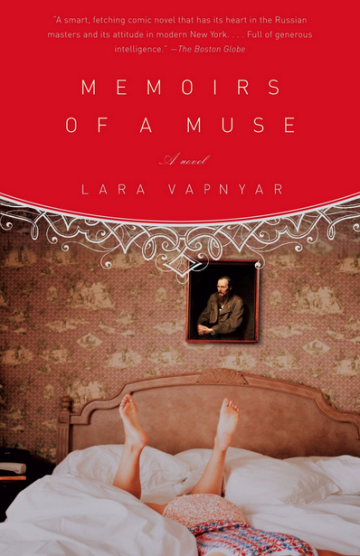Lara Vapnyar's Memoirs of a Muse
Lara Vapnyar's first novel, Memoirs of a Muse, tells the story of Tanya, a young woman who moves from Moscow to live with her struggling immigrant relatives in 1980's Brighton Beach. Tanya's romantic experience at her Soviet university has been limited and disappointing, and her sole aspiration for life in America is to become the lover and muse to a great writer.
Tanya's desire to be a muse derives from a highly literary fantasy life. Her masturbation fantasies focus on Gogol, Chekhov, Turgenev, and Dostoevsky. Tanya's role model for a muse is, in fact, Polina, Dostoevsky's elusive, cruel, and passionate mistress--the inspiration behind many of the author's great female characters.
In Brighton Beach, Tanya's family gets together for loud, ridiculous meals (including 50-piece sushi platters from Costco) and warns her of the difficulties she will face as an immigrant. There is the uncle who is always wearing someone else's clothes and boasts that he knows a "big shot" at the Society for Former Doctors from the Former Soviet Union and thinks he has "a pretty good chance of getting in." Tanya's cousin Dena is the harsh realist voice of reason. She advises Tanya to forget about her Soviet degree in history and take a crash course in computer programming. Dena is also the voice of chick lit, eschewing relationship advice like a Soviet-era Candace Bushnell. The advice seems tedious at first, but it soon becomes apparent that Tanya could use it.
To her family's surprise and delight, Tanya quickly finds a successful older novelist at a reading at an Upper West Side bookstore. Tanya spends the next three years living with Mark in his full-service Upper West Side apartment. But because she is too self-conscious to ever speak to any of his friends, and--for the majority of their relationship--can't read enough English to get through one page of Mark's novels, Tanya's life in Mark's apartment is miserable. She is happy only on the "Bard days" when Mark teaches upstate and when she can unselfconsciously sample the selection of gourmet condiments in his cabinets, happily mimicking the reactions of people in commercials tasting delicious foods.
Mark has a number of humorous quirks--most amusing is the fact that he is, for most of the relationship, "between books," and doesn't write a word. But, even if Tanya and Mark's romance is slow and unsatisfying, the experience of reading about it should not be. Tanya's insecurities and the degree to which she is subservient to Mark are at times too much to take. He is an overly unlikable character, and Tanya doesn't begin to enact all the revenge fantasies I had while reading about their pleasureless sex (the Bard days are also the only days when Tanya gets off--alone) and all the time she wasted waiting hand-and-foot on this bastard.
When it comes to Mark and Tanya's relationship, the flaws in the writing are frequently redeemed by Vapnyar's wit. It is hilarious to see some of the ways Mark exoticizes Tanya just as she romanticizes his role as a writer. For foreplay, he makes her tell him stories about her days as a Russian schoolgirl. She makes up a classroom sexual encounter in which a portrait of Lenin watched her from the wall. Mark moans, "'What about now? Do you think Lenin is watching you now?"
Of course, Tanya fails to achieve fulfillment as a muse. Like many smart twenty-something women, Tanya realizes that being the lover of a "brilliant" older man can be more self-destructive than it is empowering. Despite at least one cheesy twist at the end, Tanya is such a lovable character that her ultimate happiness is truly satisfying.
Memoirs is not driven by an evocation of setting or by a quality of the language, and it often feels like loosely assembled series of humorous vignettes. In many ways, Memoirs feels, in fact, like many contemporary memoirs, which are generally episodic and lacking in attention to language. There is a lot of meandering and little rising action, and the imagined scenes that take place between Dostoevsky and Polina feel strained and are, for the most part, not engaging.
Vapnyar's funniness is usually able to distract us from the novel's structural shortcomings-her wit is what ultimately carries the book. The humor is on par with that of David Sedaris or Vowell and she provides a wry and candid portrayal of Tanya's psyche and literary sexual fantasies. Yet, while Tanya is an interesting and complex character, this is anything but a literary novel--which is, at times, a disappointment.
There is a distinct element of chick lit present throughout this book as we see Tanya struggle to come into her own as an independent woman. But when Vapnyar decided to write a book called Memoirs of a Muse, she was most likely aiming to appeal to an audience broader than the readers of her short stories or pieces for the New Yorker. While at times I wished it could have been more deftly structured or surprising, Vapnyar has succeeded in writing a charming and very funny book.
